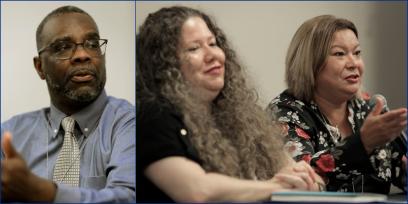How can we support all students in becoming joyful and confident readers when they enter the classroom with many diverse language experiences? Educators have differing perspectives and experiences when it comes to teaching reading, but they share the need for strategies, resources and support to be successful in reading instruction. Attendees at the pre-TEACH literacy mini-institute session “Teaching Reading Today: Knowledge, Tools and Strategies to Navigate Fast-Moving Waters” received just that.
The first part of this interactive session was led by Kareem Weaver, co-founder and executive director of FULCRUM (Full and Complete Reading is a Universal Mandate), which partners with stakeholders to improve reading results for students. Weaver, who is featured in the thought-provoking and inspiring documentary The Right to Read emphasized the crucial nature of reading instruction and lamented that although solid research on what works in reading instruction has existed (and been promoted by the AFT) for decades, many teacher education programs still do not prepare future teachers to teach reading effectively. To emphasize the point, Weaver quickly surveyed attendees; of the 40-plus K-12 and higher educators in the room, none had learned about reading instruction in their pre-service or college experiences.
Weaver led an expert panel discussing current challenges facing educators when teaching reading. Bethzaida “Betsy” Sotomayor, a teacher, AFT national trainer and member of Volusia United Educators (Florida) and Sarah Elwell, an assistant director of the AFT Educational Issues Department, shared their experiences and answered attendees’ questions, which ranged from how to advocate for research-based reading curriculum to how to support multilingual students in learning to read when there are few resources or educator supports available in the school or district. The panelists shared several recommendations, including not watering down instruction for multilingual learners, developing relationships with students and families that open avenues of communication, taking advantage of the many resources offered by the AFT and other professional development opportunities, and leaning on colleagues to share their knowledge and resources.
“Multilingual learners bring such strength to our schools and communities. No matter what grade level you teach, there is tons that we can do to support them,” Sotomayor said. “You have to reach into your toolbox, but you also have to see what they bring to the table and work from there.”
Elwell agreed and added, “In the end, you have to do what the research says works and what you know is right for kids.”
Following the panel, AFT staff members shared several resources that educators can add to their reading instruction toolboxes, including Aftpd.org, the AFT e-learning area, with its new 10-hour training on reading instruction, sharemylesson.com/read, and the many free resources on colorincolorado.org and readingrockets.org. They also encouraged attendees to visit the First Book table and learn how they can get free books for their schools and districts.
An interactive breakout session on meeting the reading needs of monolingual and multilingual newcomer students followed, led by Kristina Robertson with the Saint Paul (Minn.) Public Schools Office of Multilingual Learners. Robertson led attendees in a game to introduce them to the many obstacles to school success encountered by students with limited or interrupted formal education (SLIFE). “Many multilingual students have had an interruption in their reading instruction in their first language,” said Robertson. “But one outcome of the COVID-19 pandemic is that all children are SLIFE now.” Robertson shared several resources (many from the AFT and colorincolorado.org) that can help educators as they think about how to meet the needs of their newcomer students. She also urged attendees to constantly question their instructional practices to ensure that they are inclusive of all students’ needs. “No one can tell us a student’s full potential. They are growing and learning every day. And you will make a difference for them when you think about how you can support them.”
Weaver also reminded attendees that the AFT is a union of professionals, and “You don’t have to know everything up front. The key to being a professional, and what you’ll hear in this [TEACH] conference, is a willingness to go seek.”
[Lesley Gonzalez/Pam Wolfe photo]

